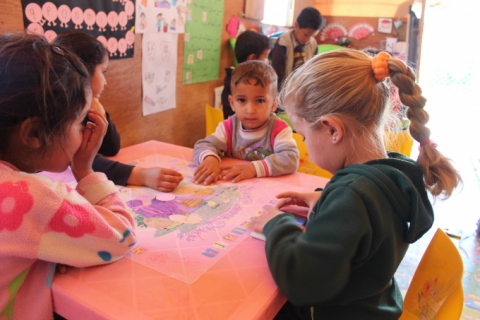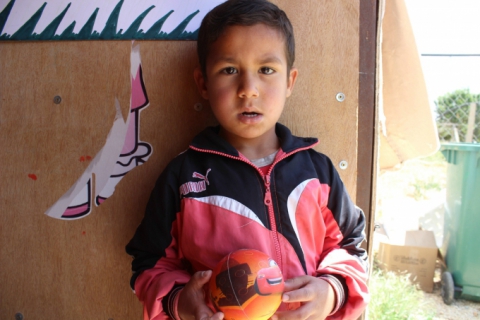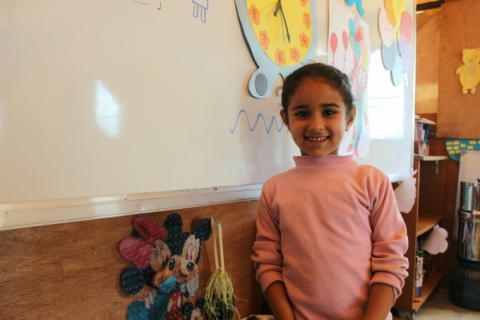A classroom they call home

Walking into this tent in the Bekaa informal settlement, there are many things that one will instantly notice.
A large, white board is adorned with colourful paper cuttings and a cardboard clock that says half past seven. Drawings of a garden, mammals and birds, numbers and letters decorate the walls. Balloons hang from the ceiling. And children are sat on four tables; eyes fixated on the corner.
A cartoon is playing, and by the end, they will need to answer an eagerly-anticipated question by their teacher: ‘’what did we learn about?’’.
Sudden burst of shouts breaks the hushed quiet of the room. Sixteen hands raised in anxious aim to make contribution.
‘’Brush our teeth after we eat sweets’’… ‘’eat fruits’’…’’drink juice’’… a barrage of answers came from the groups, and each was proud of the teacher’s praise.
The educational video is one of many other activities offered at seven Save the Children’s Early Childhood Care and Development (ECCD) centres in the Bekaa Valley, where around 400 vulnerable Syrian children between 3-6 years old receive pre-school education.
Noha, one of 28 teachers at Save the Children Bekaa Education office, said the difference in children’s behaviour over the months has been remarkable.

‘’There is a huge difference since we opened the classroom a year ago,’’ she revealed. ‘’We set clear targets and worked on them. Children now know how to read and write.’’
‘’It is important that the teacher gives the student something to look for. We don’t follow traditional methods here. They see their teacher as one of them.
They know the letters in English and Arabic. They are proud of what they do that you see them hang their work on the walls.’’
In a hindsight, the project, funded by the US Bureau of Population, Refugees, and Migration (BPRM), has enabled children to build their cognitive and education skills ahead of school years. Awareness of correct hygiene practices and good manners was instilled in them.
For Kassem’s parents, it was a mix of relief and comfort.
The six-year-old fled the conflict in Syria with his family to Lebanon. Five years have since passed, but bad memories wouldn’t easily abandon him.
Kassem’s emotionally-charged reaction to loud noises and the presence of police started to worry his mother, particularly after a blaze that broke out in the informal settlement where they stayed undermined any slight progress in his conditions.

‘’One night, Kassem* had toothache and couldn’t sleep,’’ his mother recalled with a lump in her throat.
‘’I asked him what was wrong and, in spite of his pain, he didn’t answer. It was that moment when I knew he had a serious problem.
It started back in Syria and didn’t stop here. One day, there was a fire in the informal settlement and people started running. I took the kids and ran away. He was four.’’
The last six months have been life-changing, according to Kassem’s mother. The classroom is now a place where her son interacts, plays and mixes up with his peers. The amount of improvement is a welcome development in otherwise ‘sad times’.
‘’When they first opened this class, he would stay at the doorstep. Now, he is the first to arrive. He waits for his teacher each morning.
I am happy for Kassem. There is a huge difference. He now plays, talks and mixes up with his friends. He used to be isolated and wouldn’t talk to anyone.’’
On the table next to Kassem’s sits Rama*, a beatific smile radiates from her face. She is busy doing her favourite activity; creating toothbrush and comb figurines from modelling clay.

‘’I learned how to be clean,’’ Rama started. ‘’brush my teeth, wash my hands with water and soap and use the towel.’’
‘’I can count and write the letters.. A.. B..C.. I like the teacher because she tells us stories. I like to study.’’
As the academic year draws to a close, Kassem, Rama and their friends have been equipped with adequate knowledge to join those who sat on the same chairs and attended the same tent before them.
They are ready for half past seven in the morning.
*Names have been changed for protection purposes.
 Lebanon
Lebanon